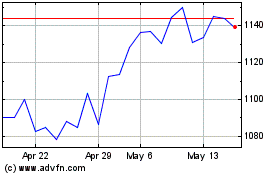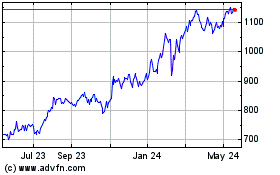By Paul Page
Sign up: With one click, get this newsletter delivered to your
inbox.
Ship owner Seaspan Corp. is placing a bigger bet on container
shipping. The ship-leasing heavyweight is buying out the
controlling shares of a China-based joint venture called GCI from
private-equity firm Carlyle Group, giving the company a bigger
share of a charter market that's been in broad recovery. The WSJ's
Julie Steinberg writes the $450 million deal brings Seaspan 18
container ships and a jumpstart to what may turn into a bigger
acquisition strategy. Seaspan is the world's largest containership
lessor by cargo-carrying capacity, according to Alphaliner, and the
combined companies would have 8% of the market. Alphaliner said in
a report this week that charter demand has been "robust" in recent
weeks, boosting ship leasing prices. The added revenues, along with
a new $250 million investment infusion from Canada's Fairfax
Financial Holdings Ltd., may give Seaspan the financial ballast to
corner still more of the market.
One of the world's iconic retail brands is giving up in the face
of changing consumer buying habits and relentless competition from
other channels. Toys "R" Us Inc. says it will sell or close all its
U.S. stores, the WSJ's Paul Ziobro and Lillian Rizzo report. The
collapse threatens up to 33,000 American jobs as well as some 1,600
stores and 60,000 jobs around the world as the company shutters or
sells stores across Europe and Asia. It marks perhaps the biggest
failure yet in a rapidly changing retail landscape, including a toy
market that's been fractured and fragmented by growing sales
through online sites and by the rise of digital games. The demise
of Toys "R" Us poses a serious challenge to the $27 billion U.S.
toy industry. The chain has been a vital cog in the industry as its
stores carried a breadth of toys unmatched by rivals and nurtured
smaller companies hoping to hit it big.
Union Pacific Corp. is adding safety monitoring to its rail yard
operations, and it's not going over well with the carrier's
employees. The freight railroad recently started flying drones over
the yards to ensure workers were following safety guidelines,
triggering citations for violations and protests from workers who
complained that the drones were a safety hazard because they
distracted them from their jobs. The clash is part of a growing
debate over the aerial technology across transportation operations
as companies look for ways to use drones to improve services and
operations -- and bumping up against traditional work patterns. The
WSJ's Paul Ziobro writes that drone use is in its infancy among
railroads, which are using the technology to inspect bridges and
track, assess damage after natural disasters and map their
far-flung networks. The UP operation is on hold, however, as the
company debates with the union over whether it's aimed at safety or
discipline.
E-COMMERCE
The parent company of fast-fashion logistics icon Zara is adding
online real estaterather than physical stores. Inditex SA is
accelerating digital investment after reporting its weakest
comparable annual sales growth since 2015, the WSJ's Jeannette
Neumann reports, pushing the trend-setting retailer to overhaul its
strategy and its supply chain. The company is following its
customers: Overall online sales surged 41% last year, although they
still made up just 10% of Inditex's sales. The company's store
closures outpaced openings in the fourth quarter, as the company
focused on opening big flagship sites while shuttering smaller
shops. The company plans to operate online stores in all 96 of its
markets, up from 49 markets today. That could chip away at
profitability since Inditex will take on extra shipping costs, but
the company insists it has fashioned a fulfillment strategy that
makes the online sales just as profitable as store sales.
The best online trend some retail real-estate experts have heard
of lately is what they call "clicks-to-bricks." A New York City
landlord recently signed four web-based apparel retailers to open
storefronts at a single Manhattan property, the WSJ's Esther Fung
reports, making the site a destination for shoppers looking to test
out physical products before they buy online. It's the latest move
by retail-space owners to rethink and renovate stores as e-commerce
continues to whittle down sales at brick-and-mortar sites.
Amazon.com Inc. has added 15 bookstores, its latest a
10,000-square-foot site in Washington, D.C., that opened this week.
Analysts say more lesser-known online sellers are looking to open
physical stores to complement their online presence. The companies
have slimmer track records and carry more risk, but they provide
landlords a new market while bigger retailers are shutting
shops.
QUOTABLE
IN OTHER NEWS
U.S. retail sales fell 0.1% in February, the third straight
monthly decline. (WSJ)
The producer-price index, a gauge of U.S. business prices, rose
a modest 0.2% last month. (WSJ)
Shares of truckers, railroads and other transportation companies
have caught up with the broader stock market after a slow start to
the year. (WSJ)
Maryland-based Transport Logistics International Inc. will pay
$2 million to settle federal charges it bribed a Russian
nuclear-energy official in exchange for uranium-shipping contracts.
(WSJ)
Sears Holdings Corp. won $540 million in new loan agreements and
said reported another dismal quarter in which sales fell by nearly
a third. (WSJ)
The board of Anglo-Dutch consumer-goods giant Unilever PLC is
favoring a plan that would consolidate its dual headquarters in
Rotterdam. (WSJ)
Lawmakers and farm groups agreed on a change to a tax provision
that favored sales to agriculture cooperatives. (WSJ)
President Donald Trump is targeting technology and
telecommunications products for potential tariffs on up to $60
billion of Chinese imports. (Reuters)
Daimler AG car unit will invest more than $123.6 million to
manufacture Mercedes-Benz cars in Thailand. (MarketWatch)
Japan's Toray Industries is set to buy TenCate Advanced
Composites, a manufacturer of aerospace and automotive parts.
(Nikkei Asian Review)
FedEx Corp. will spend $1 billion to upgrade its main
air-express hub at Tennessee's Memphis International Airport.
(Associated Press)
China's SF Express and logistics operator HAVI set up a joint
venture business for refrigerated transport. (Air Cargo News)
Cathay Pacific Airways posted its first back-to-back loss in the
airline's 71-year history despite robust earnings from cargo.
(South China Morning Post)
A fire that burned for at least two days destroyed a large DHL
warehouse in Northamptonshire in the U.K. (The Sun)
The bodies of three sailors who were missing after a fire on a
Maersk container ship were found. (AllAfrica)
The Suez Canal Authority added tankers to a discounting program
meant to draw in India-bound vessels. (Lloyd's List)
Diesel fuel prices in the U.S. fell to their lowest level of the
year. (Commercial Carrier Journal)
Amazon won a patent for an inflatable air bag that cushions
packages dropped from delivery drones. (San Jose Mercury-News)
ABOUT US
Paul Page is deputy editor of WSJ Logistics Report. Follow him
at @PaulPage, and follow the WSJ Logistics Report team:
@jensmithWSJ and @EEPhillips_WSJ. Follow the WSJ Logistics Report
on Twitter at @WSJLogistics.
Write to Paul Page at paul.page@wsj.com
(END) Dow Jones Newswires
March 15, 2018 06:45 ET (10:45 GMT)
Copyright (c) 2018 Dow Jones & Company, Inc.
Fairfax Financial (PK) (USOTC:FRFHF)
Historical Stock Chart
From Jun 2024 to Jul 2024

Fairfax Financial (PK) (USOTC:FRFHF)
Historical Stock Chart
From Jul 2023 to Jul 2024
